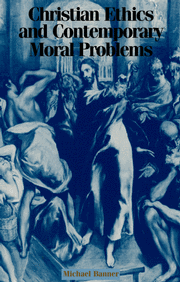Book contents
- Frontmatter
- Contents
- Preface
- Acknowledgements
- 1 Turning the world upside down – and some other tasks for dogmatic Christian ethics
- 2 Christian anthropology at the beginning and end of life
- 3 The practice of abortion: a critique
- 4 Economic devices and ethical pitfalls: quality of life, the distribution of resources and the needs of the elderly
- 5 Why and how (not) to value the environment
- 6 On not begging the questions about biotechnology
- 7 ‘Who are my mother and my brothers?’: Marx, Bonhoeffer and Benedict and the redemption of the family
- 8 Five churches in search of sexual ethics
- 9 Prolegomena to a dogmatic sexual ethic
- Bibliography
- Index
7 - ‘Who are my mother and my brothers?’: Marx, Bonhoeffer and Benedict and the redemption of the family
Published online by Cambridge University Press: 21 May 2010
- Frontmatter
- Contents
- Preface
- Acknowledgements
- 1 Turning the world upside down – and some other tasks for dogmatic Christian ethics
- 2 Christian anthropology at the beginning and end of life
- 3 The practice of abortion: a critique
- 4 Economic devices and ethical pitfalls: quality of life, the distribution of resources and the needs of the elderly
- 5 Why and how (not) to value the environment
- 6 On not begging the questions about biotechnology
- 7 ‘Who are my mother and my brothers?’: Marx, Bonhoeffer and Benedict and the redemption of the family
- 8 Five churches in search of sexual ethics
- 9 Prolegomena to a dogmatic sexual ethic
- Bibliography
- Index
Summary
We have in recent times multiplied significantly the occasions on which the question ‘who are my mother and my brothers?’, taken quite literally, could have a use. Prior to our day, it can have had few very obvious applications. Of course, we can imagine that it might have had a use for foundlings when the circumstances of their earliest days became known to them. And various utopians (such as Plato in his Republic) have dreamed of a time when the question would be asked by many, if not all, children. But, apart from such dreams, some ingenuity was required to devise employment for the question.
In our day, such ingenuity has been rendered unnecessary. The various practices of donation of gametes have brought into being a whole class of foundlings, for whom this question, ‘who are my mother and my brothers?’ has immediate use and purpose, expressing that radical dissociation and alienation which has been wished upon them by the utopian dreamers of our times. And these children, the offspring of anonymous donors or of surrogates, may yet be joined by others, born from eggs harvested from the dead or the unborn – for, if the Human Fertilisation and Embryology Authority presently judges us unready for these developments, it gives the distinct impression of biding its time whilst ‘sentiment’ catches up with ‘rational’ thought.
- Type
- Chapter
- Information
- Christian Ethics and Contemporary Moral Problems , pp. 225 - 251Publisher: Cambridge University PressPrint publication year: 1999

